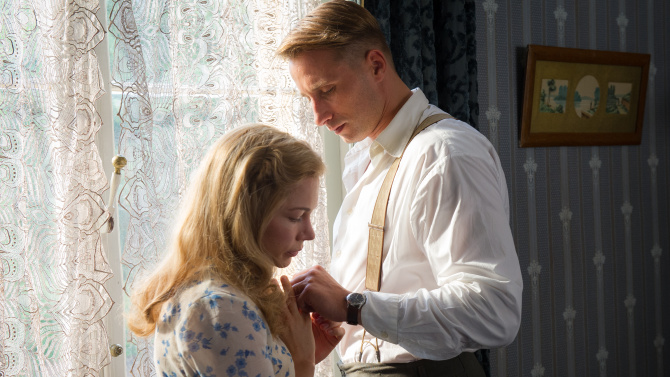Simon Kitson
University of Auckland
The story of Irène Némirovsky’s Suite Française is well-known. Originally intended as a five-part novel, only two parts were anywhere near completion when the author, whose rich Jewish family had fled Russia during the Bolshevik Revolution, was arrested and sent to Auschwitz where she died a few weeks later. The manuscript was confined to a suitcase and entrusted to Irène’s daughter Denise Epstein who, believing it was a diary of her mother’s wartime experience, didn’t open it for fear that it would be too upsetting. It was only when Denise’s house was flooded nearly 60 years later that she checked up on her mother’s manuscript and started to read its contents. She lovingly typed it up and it was published to great acclaim and huge commercial success. In 2014, it was released as a film directed by Saul Dibb.[1]
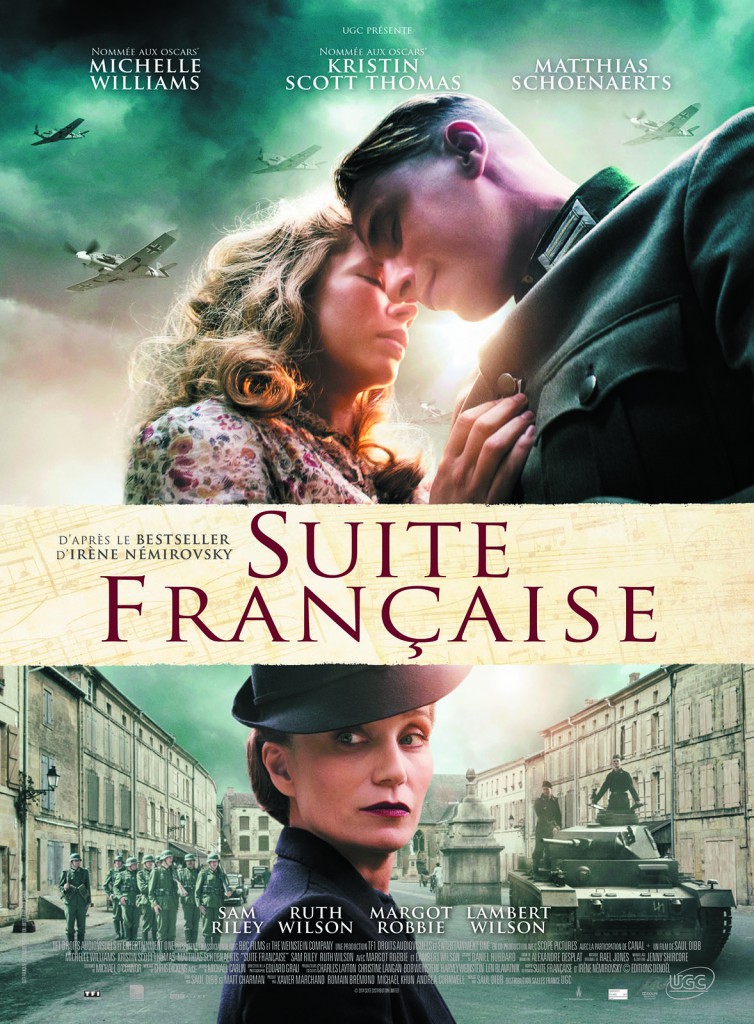 At the heart of the film are two relationships- that of Lucile (Michelle Williams) and her mother-in-law, Madame Angellier (Kristin Scott-Thomas) and Lucile’s liaison with the cultured German officer, Bruno von Falk (Matthias Schoenaerts). These relationships play around with the dynamics of jailer/prisoner interactions.
At the heart of the film are two relationships- that of Lucile (Michelle Williams) and her mother-in-law, Madame Angellier (Kristin Scott-Thomas) and Lucile’s liaison with the cultured German officer, Bruno von Falk (Matthias Schoenaerts). These relationships play around with the dynamics of jailer/prisoner interactions.
Lucile’s relationship with her mother-in-law is almost exclusively hostile in the first half of the film. Madame Angular is portrayed in even more negative tones in the film than in Némirovsky’s text. She drives a Gestapo-like traction-avant car and her descents on her tenants, compromising their privacy while seeking to collect rent, remind us of the way in which occupying forces break down the barrier between private and public space. Like a true tyrant she announces “I see everything that goes on in this house.” She is such a fearsome individual that Bruno declares: “I’m supposed to be the one everyone is afraid of but she could easily scare the plague away.” From the outset the film makes a comparison between these two women’s relationship and the war unfolding outside. The mother-in-law is exceptionally bossy declaring “When I tell you to do something you damned well do it.” She believes she can dictate Lucile’s behaviour: “I expect you to be a faithful wife.” Sarah Fishman’s excellent book describes the pressures on POW wives to conform to a moral code and here it is the Scott-Thomas character who seeks to enforce it.[2] Lucile feels imprisoned by her: she is worried that she will be thrown out–she has nowhere else to go. Her mother-in-law keeps Lucile’s source of escape, the piano, under lock and key (she deems it unseemly to play while her son is a prisoner). Lucile asks plaintively: “Do you expect me to be confined to my room?” The two women argue about Lucile’s relationship with her POW husband, Gaston. It turns out their married life was far from perfect: theirs was a marriage of convenience made worse when Gaston fathered a child with his lover. From the outset Madame Angellier is an unswerving patriot who hates the German presence in her country. Her relationship with Lucile begins to improve only once Lucile begins to work for the Resistance, finding there a purpose, and it is partly her mother-in-law who pushes her in that direction.
https://www.youtube.com/watch?v=d27ywVF_JQ0&list=PLQi9pVSPck-dq2l6cVASuX8X0szx9hhxZ
Lucile’s growing friendship with Bruno puts additional strain on the two women’s interactions. Throughout the film Franco-German trysts are interrupted, suggesting that these relationships are doomed.Thus, Lucile interrupts a peasant woman’s romp with a German.When Bruno and Lucile visit the Perrin household they catch a member of the Wehrmacht and an unknown French woman in the act. As Bruno and Lucile engage in ‘vertical collaboration’ against a wall, Madame Angellier enters the house and puts an end to their panting and groaning. Lucile and Bruno’s never totally fulfilled love affair is foregrounded in the film, as indeed it was in the book. Criticism has been levelled at the film for the way the relationship is handled: “This love affair has all the passion of a damp haddock on a slab.”[3] Nonetheless one can sense a natural complicity between the characters: both are in unhappy marriages and both can speak to each other through the language of music (Bruno not only plays the piano, he also composes). Bruno claims that he has much more in common with Lucile than with his uncouth compatriots. For both Lucile and Bruno their budding love affair offers a chance to escape from the reality of war. Asking her to dance Bruno says: “Forget all this for two minutes,” and his fellow officer Bonnet has to remind him that the two nations are still at war. For Bruno, a man of military background inclined to obey orders instinctively, his entanglement leads into uncharted territory: he begins to disobey orders, for example burning anonymous letters, or to obey them with a heavy heart, as when he has to shoot the town’s mayor.This compromises his ability to act as a good soldier. Lucile admits that she is living out a “fantasy” whilst her neighbours are taken hostage and shot.When one places love stories at the heart of war dramas one is often accused of overlooking deeper political dimensions.The Guardian claimed that “This Suite is a shallow, sugary dirge.”[4] Ultimately, however, the lovers do go their separate ways. Lucile takes the patriotic route, thereby suggesting that love doesn’t conquer all or remove all political responsibility.
The relationship between a French woman and a German officer brings us to the more general question of how the French and the Germans are presented. In an early scene a character sets the tone on national character by saying: “if you want to see what people are truly made of you start a war.”The French don’t come off well. During the Exodus, a Frenchman takes advantage of the bombing of a convoy of refugees to try to steal Madame Angellier’s car. Collaboration starts quickly and the anonymous letters pour in immediately. But, as with Némirovsky’s original, there is little mention here of French State collaboration other than a reference to the Germans working in tandem with Pétain and a brief glimpse of a gendarme pasting up German posters.The French are shown forlorn and abandoned in the early stages of the film.The future Resister, Benoît Labarie, having failed to shoot a German officer, will appeal to Lucile, believed to be a collaborator, to get an aggressive German officer removed from his farm. As in Némirovsky’s text, France is shown to be divided by social inequalities and generation gaps and the population as prone to in-fighting, despite the priest’s wish that they unite under God. For all its negative portrayals the film is not a settling of scores with France in the way the book was, and ultimately most of the main French characters move towards some sort of Resistance.
https://www.youtube.com/watch?v=B02D0CI7Aqc
If the representation of the French is more positive than in the book then that of the Germans should be seen as more negative. It is true that Bruno is overall a sympathetic character but even he has his dark sides. He can be charming and insist to the Angellier women that “I will try not to inconvenience you.” But he is sometimes bossy towards Lucile and also controls the key to the piano for much of the film. Beyond Bruno much of the portrayal of Germans consists of clichéd stereotypes.They arrive in the village to the rhythm of marching boots and sinister music.The Germans’ supposed love of efficiency is comically exaggerated: as soon as they enter a building they set the clocks to German time. Germans are open to bribes: the Major who accepts the aristocratic mayor’s cigars in return for removing his billet.
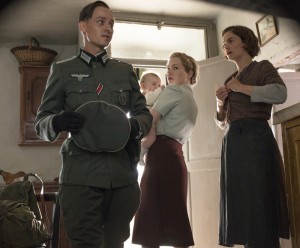
That officer, Bonnet, is presented totally negatively. In the book he had the historical backstory of a persecuted French Huguenot ancestor. Here he revels in his ability to bully his peasant host while he attempts to seduce his wife. As in the book Germans are said to have shot prisoners-of-war in 1940 and to have bombed convoys of refugees, but the film adds a more ideological dimension to the German presence: anti-communism and anti-Semitism.
The film has been criticized for not being faithful to the book. On one level, taking some liberties with the original text is not only unavoidable but perhaps highly desirable. One of the most tedious films ever made about the Occupation is Jean-Pierre Melville’s Le Silence de la Mer which tried too hard to render precisely Vercors’s 1942 novella (with just a scene about the Holocaust to differentiate the two). Melville forgot the difference between literary and cinematic media and was too literal.This does not mean that one cannot try to recapture the spirit of the original. And it is here that Dibb’s film might be at fault: he tried to be faithful to the spirit of both parts of the book, and not just the part he was adapting.
The central focus of Dibb’s film is the second story Dolce about an occupied village but most people seem to think Suite Française is about the June 1940 exodus. It is indeed the subject of the first part, Storm in June, which is more polished than Dolce. Despite its focus on the second story, there are references in the film to Storm in June. What is more, bringing in the book’s appendices with Némirovsky’s notes and elements of the author’s life, leads Dibb into geographical and chronological distortions.
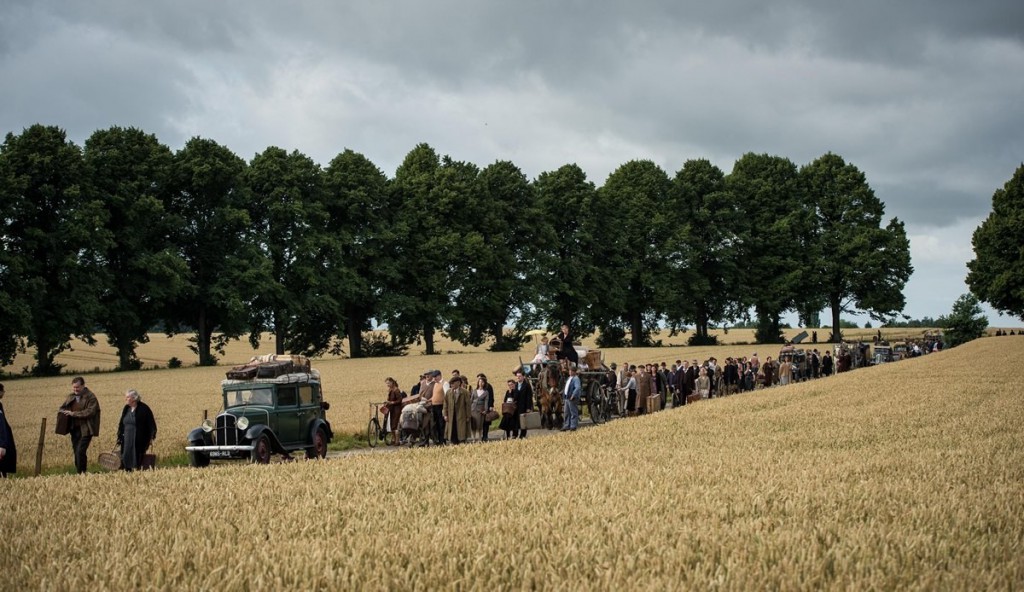
With the inclusion of Storm in June the film should have been set in Central France, the destination of Parisian refugees. But the reference to Némirovsky’s own experiences made Dibb move the action closer to the author’s refuge during the Occupation.The film is recognisably set in Eastern France, filmed in Marville in the Meuse and in Hainaut in Belgium[5] Geographically that makes no sense.
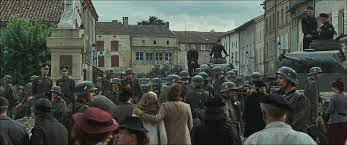 In trying to cover too much, the screenplay makes one notable addition that stands out like a sore thumb: the story of the Jewish woman Leah and her daughter Anna. Meant to represent Némirovsky and her daughter, Leah and Anna are first spotted in the exodus scene where Lucile rescues the youngster who has run off into a field. Next we see Leah in a church where a clergyman explains that the fate of many soldiers is yet unknown–we later learn that her husband is missing. Leah then witnesses the arrival of the Germans and is seen staring at a poster denouncing Jewish tyranny. She reappears several times thereafter before ultimately being arrested and led away whilst Anna ends up hidden, Anne Frank style, in the Angellier’s attic.
In trying to cover too much, the screenplay makes one notable addition that stands out like a sore thumb: the story of the Jewish woman Leah and her daughter Anna. Meant to represent Némirovsky and her daughter, Leah and Anna are first spotted in the exodus scene where Lucile rescues the youngster who has run off into a field. Next we see Leah in a church where a clergyman explains that the fate of many soldiers is yet unknown–we later learn that her husband is missing. Leah then witnesses the arrival of the Germans and is seen staring at a poster denouncing Jewish tyranny. She reappears several times thereafter before ultimately being arrested and led away whilst Anna ends up hidden, Anne Frank style, in the Angellier’s attic.
The Spectator’s review of the film was especially critical of the creation of this Jewish storyline: “What is this film playing at, when it comes to Jews in attics? Can anyone put a Jew in an attic, whenever they so fancy? Could I put a few up there, this afternoon?”[6] Némirovsky herself steered away from the creation of Jewish characters in Suite Française and she has even been criticised for anti-Semitic portrayals in some of her works. Should we therefore agree with The Spectator reviewer that Jews in attics have no place in this film? Not really, because Némirovsky made it clear that her Jewishness was the very reason why she was writing the book. As a Jew, Némirovsky felt rejected by France and sought to get her revenge by presenting the country negatively.[7] The impact of the book also owed much to knowledge that the author had been murdered for being Jewish.
 That said the creation of this storyline leads to some incongruous moments such as the Germans’ discovery that Leah and Anna are Jewish. How do they find this out?They are searching the Angellier house for the Resister Benoît Labarie when they see Jewish identity cards in a drawer. Why would they search for Benoît in there? The story-line challenges the film’s chronological accuracy.The action is set in 1940 when the Germans were more interested in expelling Jews than in rounding them up, so having Leah driven away under German guard doesn’t ring true. But, ultimately, the book’s author wasn’t that interested in historical accuracy anyway and was inconsistent in her own chronology.The film’s lack of historical anchor troubles us historians more than it should trouble devotees of Némirovsky. She championed ahistoricism and wanted her War and Peace to be meaningful beyond its actual historical context. As she wrote: “The most important and most interesting thing here is the following: the historical, revolutionary facts, etc., must be only lightly touched upon, while daily life, the emotional life and especially the comedy it provides must be described in detail.”[8]
That said the creation of this storyline leads to some incongruous moments such as the Germans’ discovery that Leah and Anna are Jewish. How do they find this out?They are searching the Angellier house for the Resister Benoît Labarie when they see Jewish identity cards in a drawer. Why would they search for Benoît in there? The story-line challenges the film’s chronological accuracy.The action is set in 1940 when the Germans were more interested in expelling Jews than in rounding them up, so having Leah driven away under German guard doesn’t ring true. But, ultimately, the book’s author wasn’t that interested in historical accuracy anyway and was inconsistent in her own chronology.The film’s lack of historical anchor troubles us historians more than it should trouble devotees of Némirovsky. She championed ahistoricism and wanted her War and Peace to be meaningful beyond its actual historical context. As she wrote: “The most important and most interesting thing here is the following: the historical, revolutionary facts, etc., must be only lightly touched upon, while daily life, the emotional life and especially the comedy it provides must be described in detail.”[8]
The director, the son of documentary filmmaker Mike Dibb, is caught between his desire to respect the text’s ahistorical spirit and that to create an historical film. Dibb has underlined that he liked the book because it was written at the time, without hindsight. He therefore attempts to render the “moment” through contemporaneous newsreels and ends with images of Némirovsky’s hand-written manuscript. However, the film’s problem is that it is narrated with hindsight. At the end of the film, Lucille tells us what will happen. True enough, Némirovsky herself projects into the future. Her notes describe her work’s intended five parts: Storm, Dolce, Captivity, Battle, Peace. She states that she is unsure when the battles and peace will take place but, referring to a prophecy by Nostradamus, suggests 1944 for the end of the occupation.[9] She takes future Liberation for granted. She also states that the Germans will die in Russia. Taking herself for Tolstoy, she claimed she was writing for the public of 1952 or 2052.[10] She herself, then, wanted the book to be read with hindsight, so while this aspect of the film might offend our historical sensibilities, it is not unfaithful in its translation of Némirovsky’s work from page to screen.
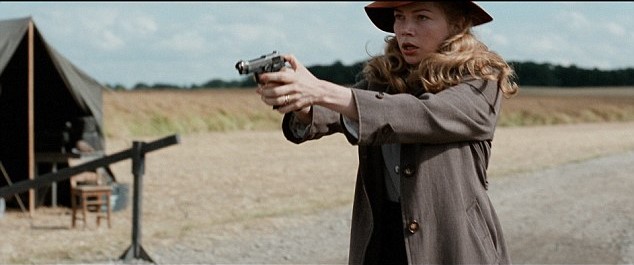 Therefore, when, in Dibb’s rendition, Lucile chooses politics over love, his interpretation strays from Némirovsky’s work but he tried to retain the spirit of the larger work by including elements of Storm in June and the book’s appendices.We might weigh the resulting mix-ups against the author’s lack of focus on the actual facts of the Occupation.What interested her was people’s behaviour and she herself got confused about chronology. Saul Dibb and co-scriptwriter Matt Charman worked with a text filled with inconsistencies, including whether Bruno spoke good French. Even if the film won’t count as a classic about the period, it has been unfairly criticised for not living up to Némirovsky’s text: many of the accusations levelled against the film could also be levelled against the book.
Therefore, when, in Dibb’s rendition, Lucile chooses politics over love, his interpretation strays from Némirovsky’s work but he tried to retain the spirit of the larger work by including elements of Storm in June and the book’s appendices.We might weigh the resulting mix-ups against the author’s lack of focus on the actual facts of the Occupation.What interested her was people’s behaviour and she herself got confused about chronology. Saul Dibb and co-scriptwriter Matt Charman worked with a text filled with inconsistencies, including whether Bruno spoke good French. Even if the film won’t count as a classic about the period, it has been unfairly criticised for not living up to Némirovsky’s text: many of the accusations levelled against the film could also be levelled against the book.
*****
If I were to use a single section of the film in the classroom, I’d undoubtedly take the section beginning at 9 minutes 44 and ending at 15 minutes 55. It raises all the issues I have described above.This segment opens with the dropping of a German tract by aeroplane over the village of Bussy. It is a reduced version of a famous German poster of the time: “populations abandonnées faites confiance au soldat allemand” (“abandoned populations place your trust in the German soldier”).The original poster designed by Theo Matejko showed a smiling German soldier with three happy (presumably French) children, one of whom is eating bread, no doubt offered by the soldier.The promise of protection returns in the film as Lucile remarks bitterly when seeing the terrible state of the requisitioned house of the Perrin family: “Is this what it means to be protected by the German army?”
Madame Angellier scrunches the tract, hinting at her reserves of defiant patriotism and suggesting that she would rather trust to her own devices than appeal to the Germans.The theme of an abandoned population is then demonstrated when the three women in the Angellier household listen separately to Marshal Pétain’s 17 June 1940 speech informing France that he is seeking to end the fighting. Pétain should be able to protect them, but he can’t. We see a newspaper in the hands of the cook, Marthe. She is using it to wrap up the family silver. Perhaps, with the collapse of democracy in 1940, a deeper idea is being conveyed that newspapers can no longer print news honestly and so should be relegated to this prosaic function. The action shifts to Lucile who is using yet more paper to wrap family photos and Gaston’s possessions whilst Pétain’s speech continues.We then see the greedy and stingy Madame Angellier handling paper, but she is counting her money and packing it away in a money box. Each of these women is alone and each seeks to protect something which is either of personal importance or for which they feel responsible.
Lucile’s voice-over then comes in: “Fear had seized the town. Word had spread that a regiment was heading to Bussy.” The action shifts to a church where the priest is calling on the population to unite under God.The service is interrupted by German tanks rolling into town, the use of rhythmic music emphasising their mechanical character.  The congregation leaves in the middle of the Lord’s Prayer just as the priest intones: “Deliver us from evil.” No protection has been offered from the government and none is available through the Church.
The congregation leaves in the middle of the Lord’s Prayer just as the priest intones: “Deliver us from evil.” No protection has been offered from the government and none is available through the Church.
As the Germans arrive, the camera takes in a poster of the advertising slogan for the alcoholic drink “Dubonnet”: “Dubo, Dubon, Dubonnet.” Is this simply by accident or is it a reference to Pétain’s moral agenda which placed the blame for France’s defeat on excessive high living? Or perhaps it is a subtle reference to Louis Malle’s film Au Revoir les Enfants. In that film, a Jewish boy in Occupied France hides under the assumed name of Dubonnet and is teased with that advertising slogan.
The German officer with the tanoy announces that he is acting in accordance with the desires of Pétain — one of the few references to the French authorities’ collaboration in the film. A Frenchman lights a cigarette for a German soldier as the population is ordered to surrender their arms. To the abdication of the civil authorities and the religious authorities is added the laying down of arms — the final loss of all military protection.We see a German soldier changing the village’s clock to German time.The conquerors were imposing their time zone on the defeated French. Madame Angellier declares she’ll be damned if “she is living by German time.”
The Angelliers return to their house and await the German officer billeted with them. Madame Angellier makes a Silence de la Mer-type statement about “we don’t look at him and we don’t speak to him.” The German officer introduces himself, with Madame Angellier looking straight at him. He immediately adjusts the house clock.The scene ends with Lucile looking curiously up the stairs after the German officer. Madame Angellier says a prayer for the absent Gaston as they sit down to dinner (a place is laid for him). The noise of the German’s footfalls is heard above causing the women of the house to look toward the ceiling. Bruno von Falk comes down to ask to use the piano. Madame Angellier tells him how to get the key. The no-speaking, no-looking at him defiance didn’t last very long.
Saul Dibb, Director, Suite Française, 2014, color, 107 min, UK, France, Canada, Belgium, Alliance Films, Qwerty Films, Scope Pictures, TF1 Production, The Weinstein Company
NOTES
- http://www.independent.co.uk/arts-entertainment/films/reviews/suite-franaise-film-review-a-romantic-but-discordant-dispatch-on-love-and-war-10104994.html
- Sarah Fishman, We Will Wait: Wives of French Prisoners of War, 1940-1945, Yale University Press; 1991.
- http://www.theguardian.com/film/2015/mar/12/suite-franaise-michelle-williams-founders-in-saccharine-version-Némirovsky -bestseller
- http://www.theguardian.com/film/2015/mar/12/suite-franaise-michelle-williams-founders-in-saccharine-version-Némirovsky -bestseller
- https://www.youtube.com/watch?v=foCky8jYH4E
- http://new.spectator.co.uk/2015/03/suite-francaise-review-what-is-this-film-playing-at-when-it-comes-to-jews-in-attics/.
- Irène Némirovsky, Suite Française, Vintage Books, 2007, p 347.
- Némirovsky, p 363.
- Némirovsky, p 357.
- Irène Némirovsky, Suite Française, Vintage Books, 2007.
